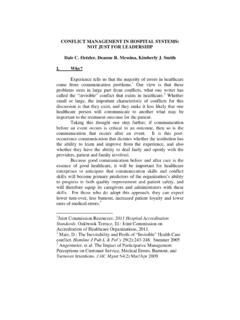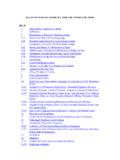Transcription of Narrative mediation and discursive positioning in ...
1 Explorations: An E-Journal of Narrative Practice 2010, Issue 2, 24 35. Copyright Dulwich Centre Foundation ISSN 1837 798X Narrative mediation and discursive positioning in organisational conflicts By Nikolaj Kure Nikolaj Kure obtained his PhD in September 2008 at the University of Aarhus, in Denmark, for a project on Narrative techniques as a means for organisational change. He now holds a position as assistant professor at the Centre for Corporate Communication, University of Aarhus. His major research areas include: organisational change, Narrative practices, conflict resolution, and organisational decision making. He can be contacted at: Abstract In this paper, I expand on the use of Narrative practices in the field of organisational mediation . Building on the mediation approach put forward by John Winslade, Gerald Monk, Alison Cotter, and Sara Cobb, I propose to conceptualise the organisation as a hierarchical discursive field that shapes organisational conflict patterns.
2 On this basis, I suggest four mediation goals for the Narrative mediator who engages in organisational conflict resolution: stimulating a sense of contingency; externalising the conflict; discovering hidden organisational experience; and building alternative stories about organisational practices. In a participatory research process with a Danish health organisation, I try to reach these goals by means of position map 1 and outsider witness practices. Thus, the article contributes to the theoretical understanding of organisational conflicts as well as to the use of Narrative practices in the resolution of such Keywords: organisational discourses, organizations, power, Narrative mediation Explorations: An E-Journal of Narrative Practice 24. As documented in a number of contexts, Narrative practices have been astonishingly helpful in therapeutic settings (see, for example, Freedman & Combs, 1996; Payne, 2006; White, 2007; White & Epston, 1990; Zimmermann & Dickerson, 1996).
3 During the last ten to fifteen years, this promising trajectory has led mediators to apply Narrative techniques within the realm of conflict resolution (Cobb, 1993, 1994, 2004; Winslade, 2003, 2006; Winslade & Monk, 2000, 2008; Winslade, Monk, & Cotter, 1998). The theoretical cornerstone that supports these mediation practices is Foucault's concept of the discourse as practices that systematically form the objects of which they speak' (Foucault, 1969, p. 49). Concretely, a discourse is understood as a local semantic system that shapes the identities of the parties in a relationship by functioning as a background for position calls' (Davies & Harr , 1990; Drewery, 2005; Winslade, 2006). A position call is an invitation to assume a relational identity, for instance, when a manager meets an employee's suggestion at a meeting with the following response, Please, let's be reasonable for a second'.
4 In responding this way, the manager positions the employee as irrational' whereas she herself is constructed as rational'. In this sense, the manager uses a culturally privileged discourse, the discourse of rationality, to shape social positions of relative power and disadvantage; the rational' manager as the privileged, the irrational' employee as the disadvantaged. Conflicts are seen as the results of such polarising positioning practices. Thus, Narrative mediators do not understand conflicts as effects of objective, contradictory interests that should be mediated; rather conflicts are seen as expressions of positioning practices that marginalise or negatively define persons in conversations (such as positioning the employee as irrational'). Narrative mediation , consequently, focuses on the expansion of the discursive resources that are drawn upon in such polarising positioning practices (Winslade, 2006).
5 The main goal in this context is to create the conditions for the growth of alternative relationship stories that challenge the dominating discourses in the relationship. In the above example, the mediator would engage in opening space for new stories about the manager/employee relationship, for instance, by examining the participants' hopes and intentions which may foster new stories about the relationship as a space for creativity' or honesty' (and not just rationality'). In effect, this would help constitute a new discursive background that does not fit into the events of the dispute and opens for less polarising and marginalising positioning practices. A number of studies have convincingly shown that Narrative mediation is fruitful in the resolution of conflicts that involve a relation of relatively little complexity, for example conflicting couples (Winslade, 2003; Winslade & Monk, 2008) or disputing neighbours (Monk, Winslade, Crocket, & Epston, 1997; Winslade, Monk, & Cotter, 1998).
6 However, Holmgren (2008) has recently shown that Narrative practices also contain the potential as mediation tools in complex organisational contexts. The present paper aims at bringing Narrative practices further into this little explored territory by developing new ideas about the use of Narrative practices as a third party mediation tool in organisations. To this end, I start off by reflecting on how organisations can be understood as webs of privileged and marginalised discourses that function as a background for position calls. By means of a participatory research process with a Danish health organisation, I hope to show that this framework is helpful when understanding conflicts in organisations. I end the paper with a number of reflections on possible ways of using Narrative practices as intervention tools in organisational settings.
7 Explorations: An E-Journal of Narrative Practice 25. discursive positioning and organisational conflict Inspired by Laclau and Mouffe's discourse theory (Laclau, 1990; Laclau, 2005; Laclau & Mouffe, 1985), I proceed to conceptualise an organisation as a hierarchic web of dominating and marginalised discourses that condition conflicts. I suggest that the idea of a discursive hierarchy' is a key concept when understanding conflict patterns in organisations. This concept helps us understand how some dominating discourses offer privileged subject positions from which some (privileged) members are entitled to negatively define others, ultimately resulting in polarised positions'. Building on Foucault's concepts of discourse and subjectivity, Laclau and Mouffe (1985) define the subject as a subject position within a discursive structure' (p.)
8 115). Identity is not given by an inner individual core, but is constituted in the network of discourses that recruit' subjects to assume certain positions. Thus, organisational identities are made possible by discursive systems of meaning that offer positions from which to act and speak. Subject positions are organised by so called nodal points' (Laclau & Mouffe, 1985, p. 112); a term originally used to describe the buttons' in a sofa to which the cover and lining is attached. Transferred to a discursive context, the term signifies the central and prominent sign that organises and keeps a discourse together. For example, a democratic management discourse is organised by the nodal point of democracy', which structures the social actions of the democratic manager. In other words, by structuring the discourse, the nodal point constitutes an overarching intention in the position, for instance, to ensure that all management initiatives are somehow democratic.
9 A central point in the discourse theory is the assumption that all discourses strive to control social practices (Laclau & Mouffe, 1985, p. 137). If we accept this, we can think of organisational discourses as systems of meaning that aim at determining different fields of practice in an organisation (for example, the fields of management, cooperation, decision . making, and so on) by pushing their subject positions forward as logical' identities. Laclau and Mouffe, however, insist that no discourse is ever able to establish itself as the only thinkable resource for identity. For example, a democratic management discourse may try to fixate all managers as democratic managers, but the discourse always finds itself challenged and disturbed by competing discourses that offer alternative positions from which to act and speak. For example, an authoritarian management discourse could compete with a democratic management discourse.
10 This point is a derivative of the distinct poststructuralist dimension implicit in the Laclauian discourse theory. Thus, Laclau and Mouffe draw heavily on the French poststructuralist, Jacques Derrida (2004), who shows that any discourse is constituted by setting a constitutive difference' with regard to other competing discourses. Paradoxically, struggling discourses function as each other's condition of existence (Laclau, 1990, p. 39), which, by implication, rules out the possibility of total discursive dominance. Instead, at least two competing discourses will operate on the same field of practice, battling to present their subject position as proper' or normal'. In effect, the organisation is the scene for a never . finalised discursive struggle, where some discourses, in the course of time, gain a prioritised, however temporary, right in the production of social reality.





